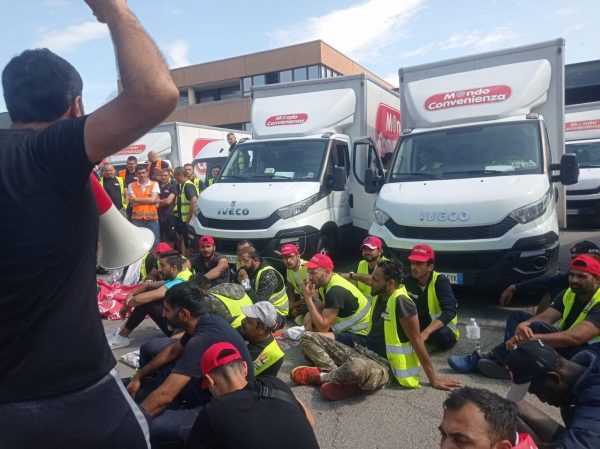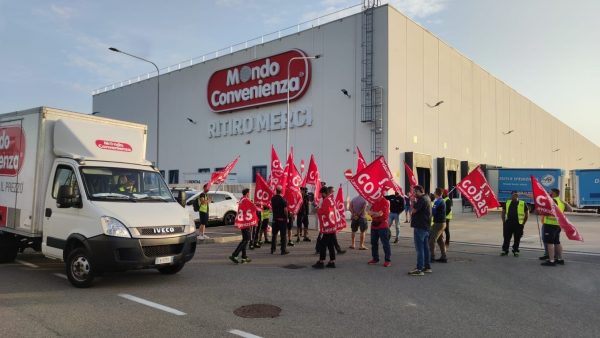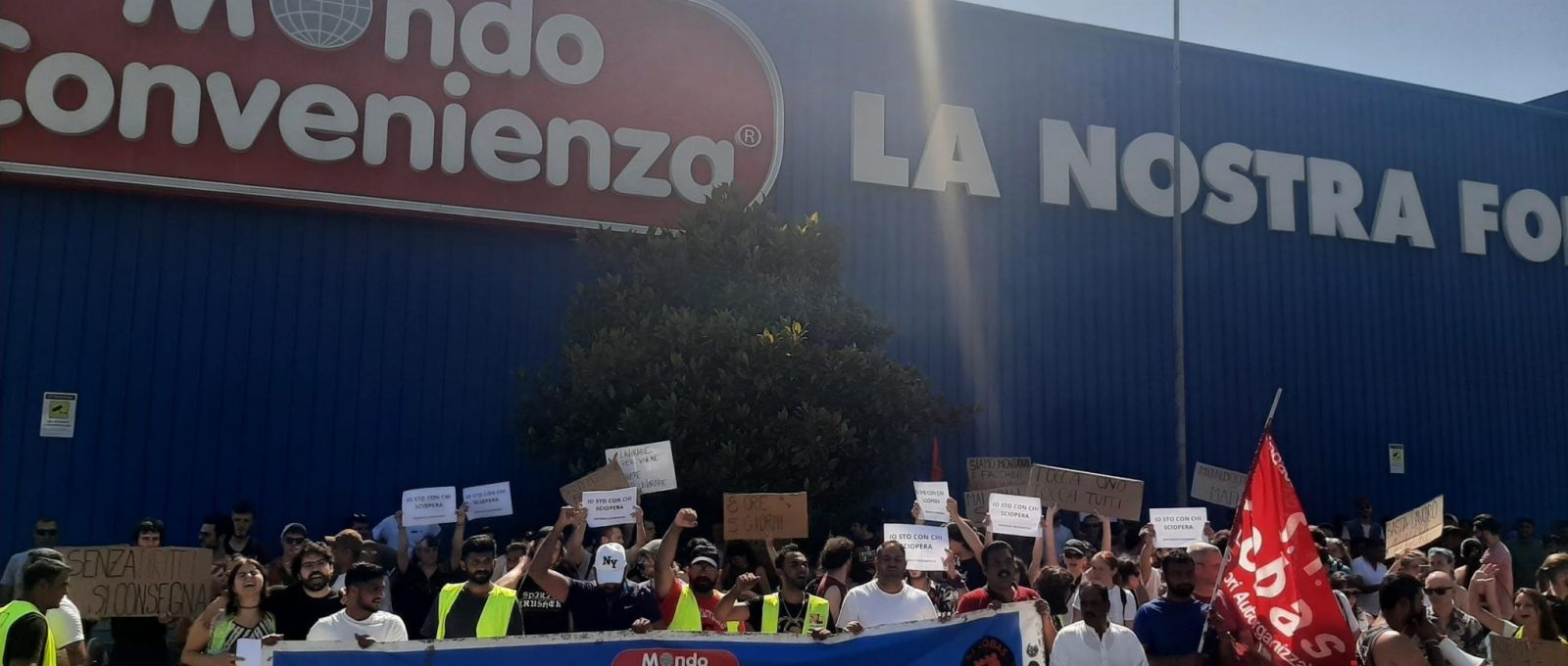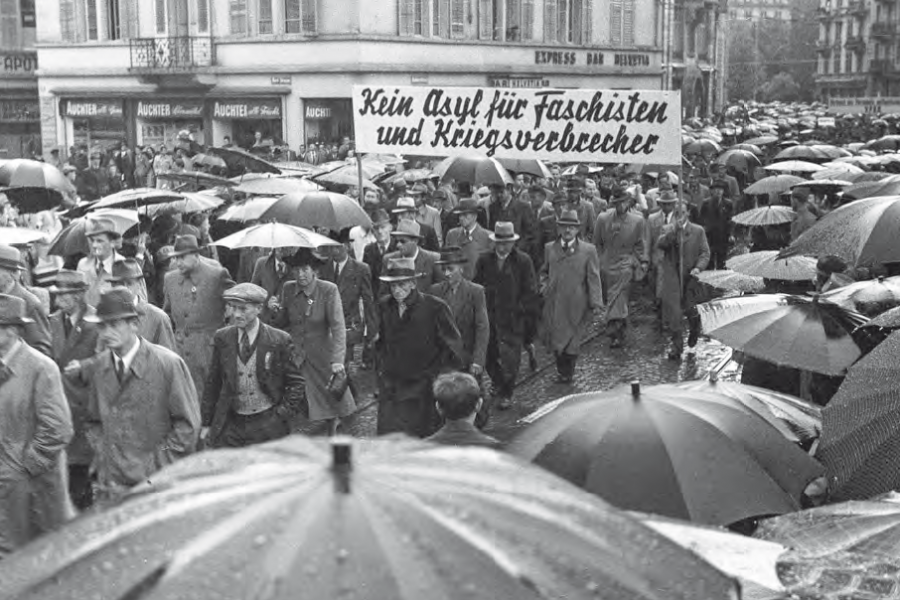Article by M. Lautéamont: Questa volta sarà diverso – diesmal wird es anders!
Translated by Angry Workers: Original article.
The municipality of Campi Bisenzio in the Florence metropolitan region is best known for the GKN factory occupation. Not far from it stands the Mondo Convenienza warehouse. The company is a major player in the furnishing and furniture industry, surpassing even the giant Ikea with a turnover of over one billion euros per year. Pickets have been standing in front of the warehouse entrance since 30 May 2023. More than two dozen drivers, furniture carriers and assemblers, organised in the grassroots union S.I. Cobas, are fighting against slave-like conditions. The striking workers come from Tunisia, Pakistan, Romania and Moldova. They have been eating, sleeping and protesting outside the warehouse gates for several weeks, blocking the truck exit. The police have cleared the pickets several times – in mid-June even for seven days at a stretch. There have been repeated injuries. But the workers have persisted and blocked the warehouse gates again after each eviction.

Precarious working conditions
The workers responsible for transporting and assembling the furniture at Mondo Convenienza are employed by the contracting company RL2-Logistica. They have to work long days. Without equipment and safety measures, they not only have to transport furniture, but also carry it up to the flats and assemble it – injuries are inevitable. The working day starts at 7 a.m. and is not over until they have transported and assembled all the furniture assigned to them – sometimes this takes until 10 p.m. Six days a week, there are no fixed working hours. The work is paid at a flat rate, so at the end of the month they get a good 1000 euros, which corresponds to an hourly wage of about 6.80 euros.
In order to push down the wages, the contract company RL2-Logistica uses a sneaky trick: although the work belongs to the logistics sector, the workers of Mondo Convenienza have a so-called multi-service collective agreement, which regulates employment relationships in the areas of cleaning, maintenance and distribution and provides for lower wages than the logistics collective contract. The workers are demanding to be employed under the logistics collective contract. On the one hand, they would earn 300 euros more per month, and on the other hand, they would be reimbursed for their travel expenses. In addition, they would only have to work 39 hours per week, overtime would be voluntary and subject to remuneration. The strikers also oppose arbitrary disciplinary measures (wage cuts of up to 40%) and the criminalisation of trade union activities. The protests have spread to Rome and Bologna since the end of June and since the beginning of July they have also been protesting in front of the Mondo Convenienza warehouse in Turin. The workers are also protesting in front of and inside the shops, giving speeches, hanging banners and handing out flyers to customers.

Temporary agencies and sub-contracting: “La vostra forza è lo sfruttamento”.
Through so-called ‘contracts for work and labour’, a company buys services from a subcontractor at a lower price than they would have to pay for regularly employed wage workers. Officially, contract workers are not considered workers at all, as the money spent for their ‘service’ only appear as part of the production costs, not as a wage. They are therefore excluded from many of the basic rights that are customary and common for workers. In the course of the flexibilisation of work and the deregulation of the labour market, which was implemented in the 1990s and 2000s, temporary agencies and contract work companies also spread. Through the outsourcing of work to subcontractors and the associated use of contract workers, labour law is bent to such an extent that international outsourcing becomes obsolete. While post-war Fordist capitalism promised full employment, social welfare measures and participation in society – at least for white skilled workers in the West – even such ideals are passé for the neoliberally deregulated labour market of modern capitalism. For decades, the working class has faced increasingly authoritarian attacks by the bosses on working and living conditions. The actions of Mondo Convenienza are a classic example of this: out of two hundred workers in Campi Bisenzio, only seven have a regular contract, all the others are subject to work contracts.
This is not the first time that Mondo Covenienza has entered into agreements with labour contractors and that they have used all the means in their power to depress wages and circumvent any labour rights. The “Mondo Convenienza system” has been known for at least ten years – the first strikes at Mondo Convenienza took place in 2014. In 2016 and 2017, for example, the company worked with the contracting company Bird Logistic, which hired workers for a warehouse in Bologna on behalf of Mondo Convenienza – again, almost all the workers were migrants. Marilena Fabbri, a Partito Democratico MP at the time, stated in a question to the Minister of Labour and Development in February 2017: “According to the trade unions, the workers affected by this conflict work around seventy hours a week, while the contract provides for 39 hours. They work without overtime pay and without recognition of holidays and public holidays, and without complying with the minimum occupational safety conditions required by law.” Similar conditions continued to come to public attention in the years that followed. In May 2023, proceedings were opened against representatives of Mondo Convenienza Holding Spa. The company describes all the accusations as “baseless“.
The violence of the state and the bosses
The fact that migrant workers are fighting back and that strikes and protests are spreading despite repression cannot be taken for granted. Compared to previous struggles at Mondo Convenienza, the workers seem to be more determined this time. The support from outside the company is also greater this time. While the police regularly clear the blockades in front of the Campi Bisenzio warehouse and beat up the strikers and their supporters, the company uses the same old methods: intimidation and dismissals. The striking workers were initially given a warning, but as the protests and strikes spread to other sites, they were dismissed in mid-July 2023. However, they only found out about this through a press release. According to the grassroots union S.I. Cobas, there is a strategic calculation behind this: the contract company RL2-Logistica wants to intimidate all its workers, even those who have not been on strike so far. In order to keep the work process going, the contract company sends workers from other cities to Campi Bisenzio every morning to pick up the furniture and bring it to the customers. This has already led to conflicts when strikers and supervisors clashed. On the 7th of June 2023, a worker was run over and injured. The danger posed by such actions brings back bad memories: In 2021, Adil Belakhdim was run over and killed by a strikebreaker while picketing outside a Lidl warehouse in Biandrate.
Violence also occurred in Bologna a few days ago: striking workers were attacked, one person suffered a broken arm, a neck injury and lost a tooth, while others sustained lighter injuries. Mondo Convenienza claims that the attack was only due to a spontaneous conflict between workers. The grassroots union S.I. Cobas, on the other hand, believes that the attack was organised. This is not the first time that paid thugs have attacked striking workers. In parallel to these violent intimidation attempts, the company is trying to increase political pressure. Bosses and supervisors, as well as paid strikebreakers from other Italian cities, protested in front of the Campi Bisenzio town hall in mid-July, demanding a crackdown on the strikers. The violence of the state and the bosses does not seem to be enough for the company, so they are resorting to other, sometimes bizarre methods. The aim is not only to intimidate the workers or to put pressure on politicians, but also to improve the company’s public image: while workers are exposed to systematic over-exploitation and go on strike against it, Mondo Convenienza hires influencers to distract from the protests and expand their presence on social media.
Solidarity is needed
The economic situation in Italy is far from rosy in various sectors. Italy is the only country in Europe where wages have fallen by a full 2.5% between 1990 and 2020, according to the OECD. Precarious working conditions permeate the whole of society, and the number of working poor has risen markedly in recent years. According to a study by the National Institute for Social Welfare INPS, a full 16 million people were considered working poor in 2019. Of course, Mondo Convenienza is not the only company that exploits its workers and circumvents labour rights. In the logistics sector in particular, migrant workers are often subjected to low wages and extreme conditions of exploitation. It is therefore no coincidence that the grassroots union S.I. Cobas has been able to gain such an impressive foothold among logistics workers over the last decades.
At the moment, the mood of the strikers is good and more and more people are supporting them. On the 8th of July 2023 there was a big demonstration outside the gates of Mondo Convenienza in Campi Bisenzio, including workers from the occupied GKN factory. There are many indications that the workers are more determined and better organised than during the strikes a few years ago. The strikers themselves wrote on social media on the 8th of July 2023: “This time it will be different […] because those who have been on strike for forty days have already left fear behind. Whether they sack us or not, no one will leave the gates of Via Gattinella here in Campi Bisenzio. The struggle goes on, until victory.“



